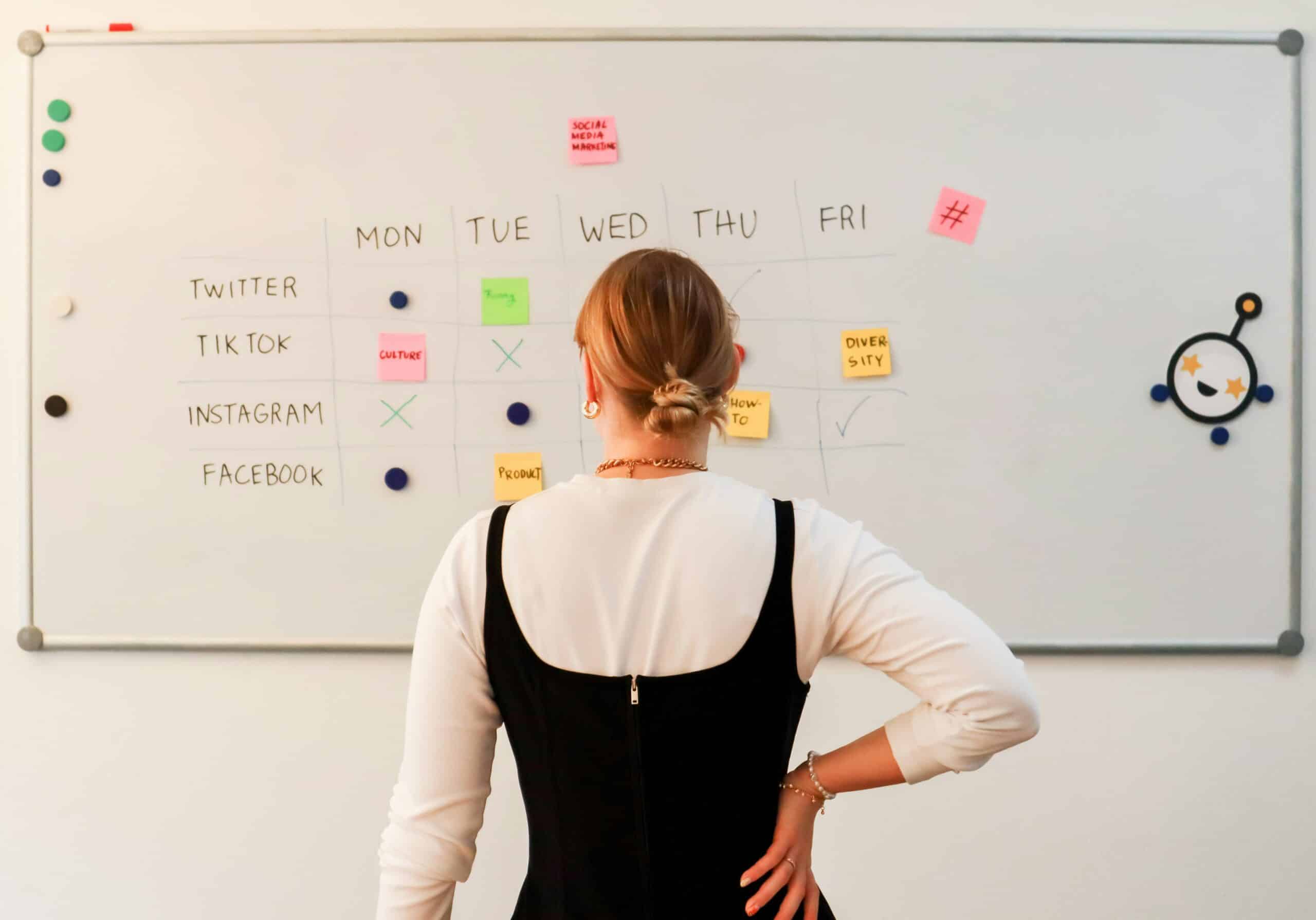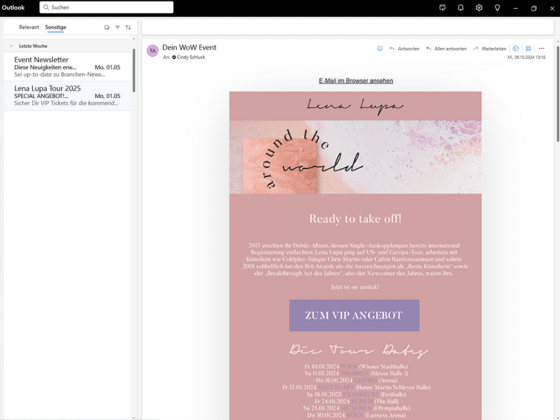The event industry is dynamic and constantly changing – what works today is already outdated tomorrow. But one thing remains constant: the power of a strong marketing plan for the success of your event. A well-thought-out marketing plan not only helps you to reach your target audience, but also to use your resources efficiently and clearly define your goals.
In this article, you will learn how to create an effective event marketing plan for 2025 – whether you are planning a small get-together or a large festival. We will show you different types of marketing plans, what should be included in every good plan and give you practical tips so that you can get started right away.
Interested in an integrated solution for ticketing, marketing and CRM?
Check out our Eventmanager and profit from our 15-years of experience in sports, culture live entertainment.

These types of event marketing plans exist
There are different types of marketing plans depending on the type of event, the budget and the objectives. In general, marketing plans can be divided into the following categories:
Long-term marketing plans:
This type of plan covers a period of several months or years and is often created for large events or series of events. They are particularly suitable for annual programs, trade fairs or festivals where a strategic overview is important.
Short-term marketing plans:
These plans focus on individual events and are particularly important in the final stages of event preparation. They contain precise measures for promotion in the final weeks before the event.
Product or service-based marketing plans:
This type of plan focuses on the promotion of specific products or services during the event. These include, for example, VIP tickets, merchandising products or sponsorship campaigns.
Why is an event marketing plan worth it?
- Clearity: You know exactly what to do and when to do it.
- Efficiency: You can make better use of resources and avoid wasting time on unimportant activities.
- Measurability: You can directly track and optimize the success of your campaigns.
9 steps to Your event marketing plan
Components of a marketing plan
- Objectives and KPI’s
- Target group anlysis (Personas)
- Campaign plan
- Content strategy and communication channels
- Budget plan
- Timeline and milestones
- Ressource plan
- Monitoring and evaluation
1. Set goals and KPIs
- Increase in ticket sales by X %
- Increase in brand awareness
- Improvement in visitor loyalty
- Number of tickets sold
- Social media engagement (likes, shares, comments)
- Newsletter open rates
2. Use Personas to define your target group
- Who are your participants?
- Wich issues would they like to resolve by visiting your event?
- Wich communication channels are they using?
If you are organizing a cultural festival, one of your personas could be “Anna, 34, art lover looking for extraordinary experiences”. Her needs: unique events, high experiential value, access to exclusive artists.

3. Chose communication channel
Now that you have a clearer idea of your target group(s), you can select the most suitable communication channels for your event promotion. Remember that not every target group can be reached on every channel and it can therefore make sense to vary the customer approach slightly depending on the channel.
- Social Media (Instagram, TikTok, Facebook)
- E-Mail Marketing
- Event-Website & Blog
4. Plan the campaign
- Early bird promotions
- Social Media Challenges
- Influencer marketing campaigns
For a concert, for example, you can plan an “early bird ticket promotion” for the first 100 buyers and a “VIP fan experience” for social media applicants.
5. Plan budget and ressources
Also take unforeseen costs into account. Flexible budget planning helps to avoid bottlenecks.
But human capital also needs to be thought through. Who is responsible for which task? And which external resources such as photographers or designers do you need? Clear resource planning helps you to maintain an overview and delegate tasks efficiently.
6. Create content
7. Set a timeline and milestones
8. Implement measures
9. Measure and evaluate achievements
Template for Your
marketing plan
The template contains:
- specific measures
- examples of how to address the right target group
- possible marketing channels
- concise schedule
Tips on how to create your marketing plan
1. Be realistic about your goals: Overambitious goals can be demotivating.
2. Use Personas: the more precisely you know your target groups, the better you can adapt your measures.
3. Pay attention to flexible budget planning: sudden opportunities should also be taken into account.
4. Work across channels: Connect different channels and always keep an eye on the big picture.
5. Monitor continuously: The plan is not set in stone – use the evaluations to make adjustments during the process.
Your Questions.
- How can I ensure that my marketing plan reaches the right target group?
To ensure that you are hitting your target group exactly, you should create detailed personas and clearly define their needs. Make sure your marketing channels match your target audience’s preferred channels – for example Instagram for younger audiences or LinkedIn for business events. Use data and feedback from previous events and analysis of social media and ticket sales to understand your target groups and tailor your campaigns accordingly.
- How do I find the right budget for marketing campaigns?
The budget should be based on your goals and the size of the event. If you are planning a large event that involves multiple marketing channels (such as social media, influencer marketing and paid ads), you should invest more accordingly. Plan a separate budget for each channel and measure and also include a buffer zone for unforeseen costs. Smaller events can also be successful with more cost-effective measures such as organic social media and targeted email campaigns.
- How do I deal with unforeseen changes during event planning?
The event market is dynamic and there can always be unforeseen changes, e.g. in terms of postponements or unforeseen cancellations. A marketing plan should therefore be flexible and offer the possibility to change scenarios. Make sure that you make regular checks and adjustments to your plan so that you can react flexibly to unexpected events. A good monitoring system for campaign performance helps you to identify problems at an early stage and react quickly.
- How do I measure the success of my event marketing activities?
Measuring success should be an integral part of your marketing plan. Use KPIs such as ticket sales, reach of social media posts, engagement rate (likes, shares, comments) and the performance of email marketing campaigns (open and click-through rate). Create a dashboard that gives you an overview of all relevant KPIs. Analysis tools (such as Google Analytics, social media insights and ticketing software) provide you with valuable data to measure success and make adjustments if necessary.
- What are common mistakes in event marketing planning and how do I avoid them?
A common mistake is not defining the target group precisely enough or focusing on too few marketing channels. In addition, many event organizers underestimate the need for clear, regular communication with their target group. Make sure that you use all channels consistently and in a targeted manner without overloading your target group with too much information. Another problem is the underestimated budget – especially for larger events. Always plan a realistic budget and take into account all expected expenses, from advertising to external service providers.
- How do I select the right channels to achieve the maximum ROI?
The choice of the right channels depends heavily on your target group and the planned marketing measures. Social media such as Instagram or TikTok are well suited if you want to address a younger target group, while LinkedIn and email marketing are ideal for business events or specialized target groups. Make sure to integrate all channels – e.g. through targeted social media ads, influencer marketing and retargeting campaigns. Use content marketing and SEO to remain visible in the long term and generate traffic again and again through search engine discoverability.
- How can I continuously increase ticket sales during event preparation?
Ticket sales should be continuously increased over the entire event preparation period. Early bird offers, limited VIP tickets and exclusive promotions for the first buyers are ideal for attracting early buyers. Reminder campaigns and countdowns can keep interest high and increase the impulse to buy. Cross-selling strategies such as upgrades or merchandise offers during the ticket purchase can also help to increase sales.

What security aspects should be included in an online ticketing system?
READ NOW
3 ideas to increase the repurchase rate of your visitors with pre-show messages
READ NOW